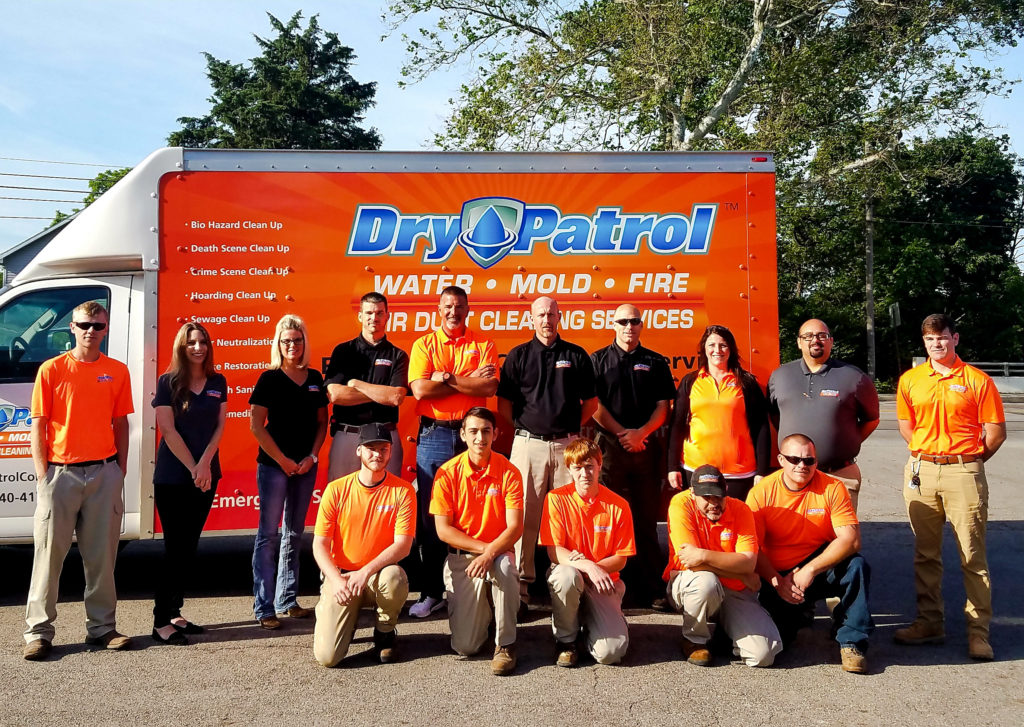
Restoration and remediation contractors provide a unique blend of services. A lot of what they do is clean up and hazard removal, but many also provide reconstruction services to get buildings back to the way they were before the disaster. The variety of services they provide can create a lot of confusion around their right to file a mechanics lien if they don’t get paid.
In an attempt to make things clearer, let’s look at what type of work restoration and remediation contractors can file a lien for — and what type of work is less likely to be protected.
An overview of mechanics lien rights
A mechanics lien is perhaps the most powerful tool contractors have when it comes to securing their payment. In most states, the statutes specify that liens are valid for work that provides a “permanent improvement” to the property.
Determining lien rights is relatively straightforward on new construction or a renovation project. The contractors are building a permanent structure that materially improves the property it sits on. Typically, all of the labor and materials that goes into these projects is lienable — that is, the contractor or supplier can file a lien to recover the costs if they don’t get paid.
What is a “permanent improvement?”
The term “permanent improvement” actually contains a pretty substantial gray area. For example, if your company remediates mold in a client’s home, most people would consider that to be a “permanent improvement.” After all, a house without mold is better than one with mold.
And demolishing a burned-out house could also be seen as a permanent improvement, since the damaged building is both an eye-sore and a safety hazard. Demolition is necessary before a new structure can be built.
However, as we’ll explore in this article, there is plenty of disagreement about what constitutes “a permanent improvement” for the purpose of claiming a mechanics lien. The laws vary widely from state to state. While some states clearly provide lien rights for specific types of restoration work, other states leave it open to interpretation by the courts.
If a contractor tries to foreclose on a lien for work that isn’t lienable, “his case will be dismissed,” says California attorney Brion Berkley. So, it is important for restoration contractors to know what work is lienable so they can avoid spending money on a lien they can’t collect.
Lien rights depend on the type of restoration work
Restoration and remediation contractors typically provide a variety of services, from demolition and cleanup to drywall installation and painting. Depending on where the project is located, your work may or may not be protected by the state’s mechanics lien rules. To make it even more complicated, some of your work may be covered, while other work isn’t.
If you’re unsure whether you have lien rights on a project, seek legal help. “It is best to consult with an attorney to provide advice on what portions of your invoice are lienable,” says Utah attorney Chase B. Ames, “and to ensure that you have met the statutory prerequisites before moving forward.”
Note: Whether or not you ultimately do have lien rights, it’s important to take every action you can to ensure that you get paid what you earn.
Inspection
Some restoration and remediation contractors provide initial inspection services to determine the structural integrity of a building and assess the amount of work that needs to be completed. In general, because inspection work does not permanently improve the property, it is typically not considered lienable work.
Related question: Can a home inspector file a lien in Florida?
Review your state’s statutes regarding lienable work for more clarity.
Cleaning
Cleaning up is often a large part of a restoration contractor’s work. They may be hired to handle a sewage backup, biohazard disposal, graffiti cleanup, or odor removal.
In one case in Utah, the Court of Appeals decided that flood mitigation, including water extraction, protecting furniture, drying, cleaning and deodorizing carpets, and applying a microbial agent to prevent mold do not count as permanent improvements. The court identified “physical annexation and physical alteration of relative substance and durability as essential characteristics of lienable work.”
One test to determine if cleaning services are lienable is how close they come to a construction project. If you are providing final cleaning after a remodel or new construction, your services may be considered part of the project and be lienable. Even attorneys disagree whether cleaning services such as drying and sanitizing fall under the scope of mechanics lien rights.
But if you are providing weekly services at a building with no ongoing construction, your chances of being able to file a valid lien are greatly diminished.
Not to sound like a broken record here, but it’s always best to consult with an attorney to see if you have lien rights. Each case is different.
Demolition
After a fire, tornado, or hurricane, many restoration contractors end up demolishing portions of the building. This often happens when a structure is damaged and new work needs to be installed, like walls or flooring. Whether demolition work is lienable seems to be a matter of interpretation of the law.
Many states specifically include demolition work in their lien laws, while a handful do not. For example, California’s mechanics lien laws specifically list “demolition or removal of improvements, trees, or other vegetation” as protected work.
However, in states that don’t include “demolition” in their mechanics lien definitions, courts can be very strict in their interpretation of lien laws. Take Delaware for example, their lien statutes grant lien rights for “the erection, alteration, or repair” of structures. When a demolition contractor filed a lien, the Superior Court dismissed the claim stating that “the inclusion of demolition work within the ambit of ‘erection, alteration, or repair’ enlarges the scope of the Act beyond the limits fixed by the General Assembly.”
Similarly, in an Ohio case, the court acknowledged that demolition usually constitutes lienable work. But because the statute omitted it from the description of lienable work, the court ruled against a contractor seeking to file a lien for demolition.
Contractors who provide demolition services should review state statutes carefully, and consult with a construction attorney before starting a project.
Mold/biohazard remediation
Mold remediation work typically involves removal, cleaning, and disinfecting of contaminated areas. Contractors use specialized equipment and methods to remove existing mold and prevent new mold from growing.
This remediation work often falls somewhere between cleaning and demolition work. It could be considered a permanent improvement to the property, since it could cause real damage if left untreated.
Whether or not lien rights are available will likely hinge on the type of work, and whether it is part of a larger construction project. And, of course, it all depends on the rights outlined in the state statute.
Remediation work is often different than what most statutes consider to be lienable. “Water and mold remediation is far less tangible than other lienable work,” writes construction attorney Matt Viator. “And, ‘removal’ usually refers to demolition or physical separation of parts of an improvement – not to water or mold that’s taken hold of the property.”
Similarly, biohazard remediation may be lienable work, depending on the scope of the project. “A biohazard remediation company would likely be considered an improvement to the property giving rise to lien rights protection,” says attorney Nate Budde. “But it is not completely cut and dried, and could still conceivably depend on the scope of work for a particular job.”
Before taking on this type of work it’s best to check the statutes in your state and consult with a construction attorney.
Asbestos abatement
Asbestos abatement involves the removal and disposal of materials including asbestos. Contractors often need a special license to handle asbestos, ensuring they avoid contamination of the air and protect workers’ respiratory health.
The lienability of asbestos abatement work may depend on its place in the overall project. A Minnesota court held that abatement was lienable because it was integral to the demolition of a building in preparation for a new building being constructed. The court ruled that the abatement work “bore directly on the construction work because it was necessary in order for the construction progress to begin.”
Reconstruction
This is probably the easiest of all types of restoration work. It may involve simply replacing floors, patching a roof, or sheet rocking all the walls. While much restoration work involves removal of materials, reconstruction involves addition of new materials. All of the materials, labor, and equipment used for reconstruction would almost certainly be protected by a state’s mechanics lien laws.
This work is seen as a permanent improvement to the property and is generally lienable, similar to other construction work.
Licensing & lien rights
In addition to navigating lien rights in different states, restoration companies also need to pay close attention to state licensing rules for contractors. This is especially true after a natural disaster. Some states have enacted legislation specifically for contractors after a natural disaster or emergency.
Not holding the proper license in some states can invalidate your right to file a mechanics lien. But your lien rights may be the least of your worries. In some states, performing work without a license(when one is required) is punishable by serious fines and jail time.
For example, California publishes a guide called After a Disaster, Don’t Get Scammed, which says: “Without a California contractor license, it is illegal and punishable as a felony to perform contracting work in a disaster area where a state of emergency has been declared.” Violators can be fined up to $10,000 or spend up to 16 months in state prison.
This is another instance where it pays to always get the appropriate contractor’s license for the type of work you are performing.
Notices speed up payment regardless of lien rights
To maintain your legal right to file a lien on this type of work, be sure to follow the process for the state the project is located in. Some may require preliminary notices before work begins and/or notices throughout the project.
Sending a preliminary notice is beneficial, even if it’s not required. Being visible to the owner and general contractor, if there is one, often speeds up the payment process. They want to ensure that everyone on the project receives their payment to keep the property free of liens.

Preliminary notices work
Learn how a restoration contractor in Ohio used preliminary notices to cut their collection time from 90 days to 17 days.
When it comes to determining if your work is lienable, a construction attorney is a restoration contractor’s best friend. They can educate you on your state’s statutes to ensure that you are protecting your lien rights when you have them.
